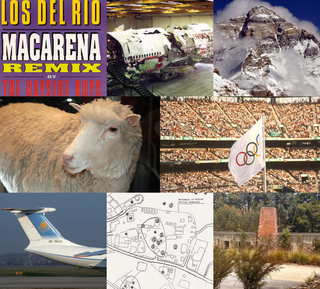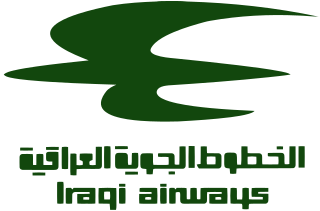Related Research Articles

Prohibition is the act or practice of forbidding something by law; more particularly the term refers to the banning of the manufacture, storage, transportation, sale, possession, and consumption of alcoholic beverages. The word is also used to refer to a period of time during which such bans are enforced.

1996 (MCMXCVI) was a leap year starting on Monday of the Gregorian calendar, the 1996th year of the Common Era (CE) and Anno Domini (AD) designations, the 996th year of the 2nd millennium, the 96th year of the 20th century, and the 7th year of the 1990s decade.

Iraqi Airways Company, operating as Iraqi Airways, is the national carrier of Iraq, headquartered on the grounds of Baghdad International Airport in Baghdad. It is the second oldest airline in the Middle East. Iraqi Airways operates domestic and regional services; its main base is Baghdad International Airport. Iraqi Airways has been on the list of air carriers banned in the European Union since 2015 due to failing to meet EU safety criteria.

Tariq Aziz was an Iraqi politician who served as Deputy Prime Minister, Minister of Foreign Affairs and a close advisor of President Saddam Hussein. Their association began in the 1950s when both were activists for the then-banned Arab Socialist Ba'ath Party. He was both an Arab nationalist and a member of the Chaldean Catholic Church.

The Islamic Dawa Party, also known as the Islamic Call Party, is a Shia Islamist political party in Iraq. Dawa and the Supreme Islamic Iraqi Council are two of the main parties in the religious-Shiite United Iraqi Alliance, which won a plurality of seats in both the provisional January 2005 Iraqi election and the longer-term December 2005 election. The party is led by Haider al-Abadi, who was the Prime Minister of Iraq from 8 September 2014 to 25 October 2018. The party backed the Iranian Revolution and also Ayatollah Ruhollah Khomeini during the Iran–Iraq War and the group still receives financial support from Tehran despite ideological differences with the Islamic Republic. As of 2019, after two decades of political prominence and success, it is suffering from internal divisions and on danger of losing its "political relevance".

After the 2003 invasion of Iraq, evidence began to emerge of failed attempts by the Iraqi government to bring the conflict to a peaceful resolution.

Arak or araq is a distilled Levantine spirit of the anise drinks family. It is translucent and unsweetened.
Events from the year 2004 in Ireland.

The Independent High Electoral Commission is Iraq's electoral commission. The electoral commission is headed by a nine-member board. Seven of those members are voting and must be Iraqi citizens. The IHEC is currently headed by Judge Judge Jalil Adnan Khalaf.
Sheikh Mohammed Khalid Ibrahim is a Bahraini Islamist politician and a member of the Al-Menbar Islamic Society in Bahrain. He was an MP in the lower house of the Bahraini parliament, having been elected in the 2002 Bahrain parliamentary elections representing a constituency from the Northern Governorate. Khalid is a known outspoken critic of the Bahraini government over conservative issues such as the selling of alcohol.

Erbil International Airport, is the main airport of the city of Erbil in the Kurdistan Region, Iraq. It is administered by the Iraqi Government and the Kurdistan Regional Government under a committee consisting of the Prime Minister of Kurdistan and is one of two international airports, with a third in Duhok being under construction. The new modern airport opened in 2005. The airport has one of the longest runways in the world.

Sulaimaniyah International Airport is an airport 14 kilometers outside the city of Sulaimaniyah, in Kurdistan Region, Iraq. The airport encompasses an approximate area of 13.5 square kilometers. The combined capacity of the airport terminals is currently set at 1.5 million passengers per year, and can be expanded to accommodate up to 3 million passengers annually.

Thomas Alun Rhys Davies is a Welsh Labour and Co-operative party politician serving as the Member of the Senedd (MS) for Blaenau Gwent since 2011, and formerly Mid and West Wales from 2007 to 2011. He has served in several Welsh government offices, including Cabinet Secretary for Local Government and Public Services, Minister for Lifelong Learning and Welsh Language, and Minister for Natural Resources and Food.

Parliamentary elections were held in Iraq on 7 March 2010. The elections decided the 325 members of the Council of Representatives who would elect the prime minister and president. The elections resulted in a partial victory for the Iraqi National Movement, led by former Interim Prime Minister Ayad Allawi, which won 91 seats, making it the largest alliance in the Council. The State of Law Coalition, led by incumbent Prime Minister Nouri Al-Maliki, was the second largest grouping with 89 seats.

Alcohol laws are laws in relation to the manufacture, use, being under the influence of and sale of alcohol or alcoholic beverages that contains ethanol. Common alcoholic beverages include beer, wine, (hard) cider, and distilled spirits. The United States defines an alcoholic beverage as "any beverage in liquid form which contains not less than one-half of one percent of alcohol by volume", but this definition varies internationally. These laws can restrict those who can produce alcohol, those who can buy it, when one can buy it, labelling and advertising, the types of alcoholic beverage that can be sold, where one can consume it, what activities are prohibited while intoxicated., and where one can buy it. In some cases, laws have even prohibited the use and sale of alcohol entirely, as with Prohibition in the United States from 1920 to 1933.

Alcohol prohibition in India is in force in the states of Bihar, Gujarat, Mizoram, and Nagaland. All other Indian states and union territories permit the sale of alcohol.
Infrastructure of Iraq describes the infrastructure of the country of Iraq. Throughout the history of Iraq, the country's infrastructure, along with its politics and economy, have been affected by armed conflicts; none more serious than the 2003 Invasion and subsequent reconstruction.
In accordance with Iraqi law, citizens of most countries require a visa to visit Iraq. However, visitors from certain countries are given a visa on arrival in select airports and certain countries are banned from entering Iraq.
Many organizations reacted to the enactment of Executive Order 13769, titled "Protecting the Nation from Foreign Terrorist Entry into the United States," which was an executive order issued by United States President Donald Trump. Domestically, the order was criticized by Democratic and Republican members of Congress, universities, business leaders, major corporations, Catholic bishops, and Jewish organizations. Some 1,000 U.S. diplomats signed a dissent cable opposing the order, setting a record. Public opinion was divided, with initial national polls yielding inconsistent results. Protests against the order erupted in airports and cities.
References
- ↑ "Iraqi minister incensed by airport display bans alcohol". The Guardian . Retrieved 2005-08-05.